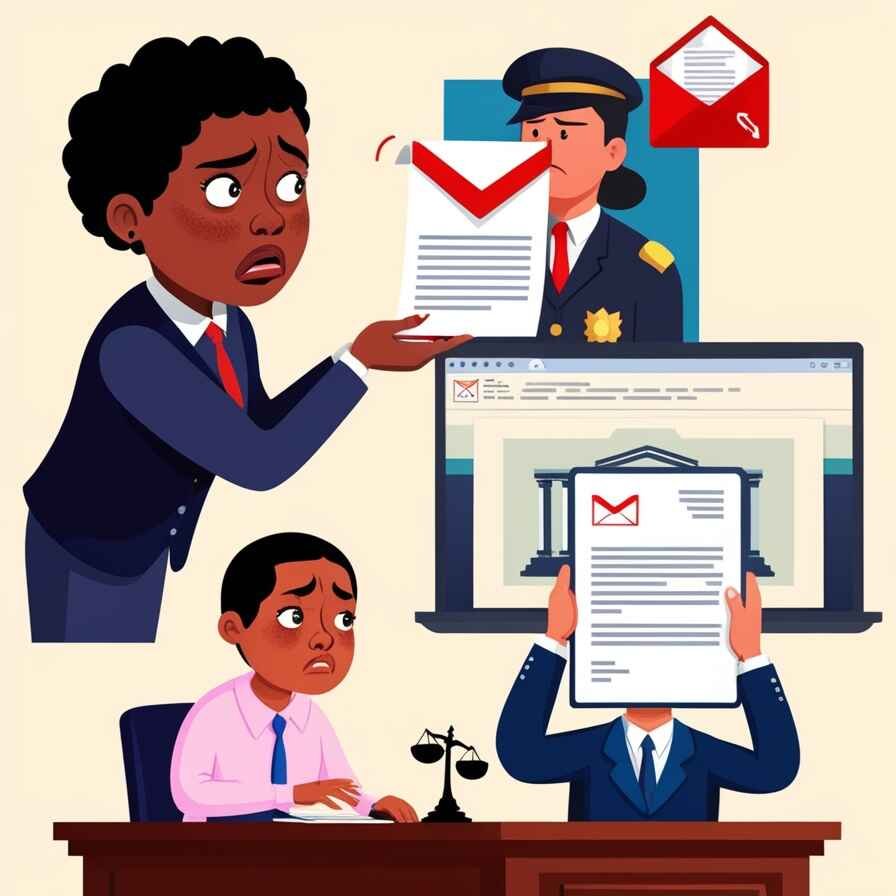In legal matters, being notified of a lawsuit is a critical process that ensures the defendant’s right to be heard in court. This notification, known as service of process, must be carried out in a manner that satisfies legal standards, enabling the defendant to properly prepare a defense.
Over the years, traditional methods of serving legal notices have evolved, with the rise of electronic communication raising questions about whether it is possible to be notified of a lawsuit by phone.
This article explores the different methods of being notified of a lawsuit, focusing specifically on whether a phone call can serve as a legal notification.
While technology has transformed communication, the legal system’s adherence to formal processes remains robust, and it’s essential to understand where phone calls fit into these procedures.
Traditional Methods of Being Notified About a Lawsuit
Being properly notified about a lawsuit is an essential step in legal proceedings, ensuring that the defendant knows about the case and can respond accordingly.
Below are the traditional methods commonly used in the USA and Canada for lawsuit notifications:
Personal Service
Personal service is the most reliable and standard method of delivering legal documents. This involves handing the lawsuit documents directly to the defendant, ensuring they receive the papers in person.
In most cases, a professional process server, sheriff, or someone appointed by the court delivers the documents.
Certified Mail
Certified mail is another official method used to deliver legal documents. With this method, the defendant receives the lawsuit through the postal system, and a return receipt verifies that the papers were offered and accepted.
Electronic Notifications (Email, etc.)
Some jurisdictions allow electronic notifications through email or other digital platforms, though this method is more commonly used for legal updates rather than the initial service of a lawsuit.
Courts may require prior consent for email notifications or the use of specific court-approved platforms.
Each of these methods is considered valid under the law because they provide verifiable proof that the defendant has been notified of the lawsuit.
Courts in both the United States and Canada recognize these methods as legitimate for serving lawsuits, provided they meet the necessary legal requirements.
Can Someone Call You to Inform You of a Lawsuit?
Now, let’s address the central question: Can you be notified of a lawsuit by phone?
USA Perspective
In the USA, the law is clear—phone calls do not constitute a valid method of service of process. A phone call cannot replace the formal, legal requirement of physically delivering the documents to the defendant.
In the legal process, official notice needs to be recorded and verified, which is not possible with just a phone conversation. While a phone call may be used to alert someone about an upcoming lawsuit or to share informal information, it does not fulfill the requirement for legal notification.
Canada Perspective
In Canada, the rules are similar. Like in the USA, phone calls are not recognized as an official method of serving lawsuit documents. Although a phone call can notify the defendant that legal action may be pending, it is not considered a substitute for the formal service of the lawsuit.
Defendants must still be served through recognized means such as personal service, certified mail, or electronic notification in certain approved cases.
What to Do if You Receive a Phone Call About a Lawsuit
If you receive a phone call claiming that you are being sued, it’s essential to remain calm and take the following steps:
Verify the Call
Ask for specific details such as:
- Case number
- Court location
- Name of the plaintiff
Scammers may use scare tactics, so obtaining these details is a crucial first step.
Contact the Court
After obtaining the information, contact the court directly using official channels to verify whether a lawsuit has indeed been filed against you. Courts can confirm the authenticity of the claim and whether you have been officially notified through proper channels.
Were You Properly Notified of the Lawsuit?
To ensure that you have been properly notified, it’s essential to confirm that the legal process was followed accurately. A phone call does not meet the legal criteria for service of process, so it’s necessary to verify that proper methods were used. These methods may include:
- Personal service
- Certified mail
- Email (if applicable)
Failure to properly serve a lawsuit can have significant legal implications. If you believe you were not properly notified, you may be able to challenge the lawsuit on the grounds of improper service.
Legal Notification Methods and Validity
The law requires that lawsuits be served through formal and traceable methods. Below are key legal terms related to this process:
Affidavit of Service
An affidavit of service is a sworn statement from the individual who served the documents, confirming that the service was completed correctly. This affidavit is crucial in proving that the defendant was notified according to legal standards.
Nail and Mail Service (New York CPLR § 308(4))
This method allows for the lawsuit documents to be nailed to the door of the defendant’s last known address and a copy to be mailed, but only after due diligence has been demonstrated in attempting personal service.
Posting and Mailing of Documents
Another recognized method in some jurisdictions involves posting legal documents at a specific location (such as a residence or workplace) and mailing a copy to the defendant. Like nail and mail, this method often requires due diligence efforts to have been exhausted.
Suitable Age and Discretion Service (CPLR § 308(2))
Under certain conditions, legal papers can be served to an individual of suitable age and discretion at the defendant’s residence. The person accepting the papers must reside with the defendant, and a follow-up mail notification is typically required.
Sewer Service: Legal or Fraudulent?
Sewer service refers to fraudulent service practices where legal documents are never properly delivered to the defendant. The process server falsely claims to have delivered the documents, which can lead to default judgments against unaware defendants.
Is Sewer Service Legal?
No, sewer service is not legal. It is a fraudulent practice that undermines the defendant’s right to due process. Legal action can be taken against individuals or companies involved in sewer service.
How Big of a Problem Is It?
While sewer service is not common, it is still a significant concern in certain areas, particularly in high-volume legal cases. Courts take these claims seriously, and defendants who suspect they were victims of sewer service should immediately seek legal advice to contest the service.
How to Check When You’ve Been Sued
Being notified about a lawsuit can be overwhelming, especially when you receive information via phone. However, phone calls or voicemail messages are not valid legal notifications in most jurisdictions. To confirm whether there is a lawsuit filed against you, follow these steps.
Steps for Verifying Whether There Is a Lawsuit Filed Against You
- Check Court Records
The most reliable way to confirm if you’ve been sued is to directly check the court records. Many court systems allow individuals to search online databases or visit the courthouse to check if there is any active case under their name.
- Contact the Court Clerk
If you’ve received a suspicious phone call or voicemail, it is recommended to contact the court clerk of the appropriate jurisdiction. They can verify if there is an ongoing lawsuit involving your name.
- Review Credit Reports
Judgments can sometimes appear on your credit report, especially if it’s related to a debt. Monitoring your credit regularly can help you catch any unexpected legal actions.
- Consult Legal Counsel
A lawyer can assist in verifying the legitimacy of any claims and guide you through the legal process if a lawsuit is indeed filed.
What Is a Default Judgment and How to Know If One Has Been Entered Against You?
A default judgment is when the court rules in favor of the plaintiff because the defendant failed to respond to the lawsuit within the given time frame.
Here’s how you can determine if a default judgment has been entered against you:
- Court Notification
Typically, the court will notify you via written notice if a default judgment has been entered.
- Bank or Employer Notice
Wage garnishment or bank account levies might be a sign that a default judgment has been placed against you without your knowledge.
- Credit Report
Judgments often appear on credit reports, indicating legal action.
Protecting Yourself After a Judgment Is Entered
If a judgment has been entered against you, all is not lost. There are ways to protect yourself and minimize the consequences, even after the judgment is filed.
Can You Protect Yourself After a Judgment Has Been Entered?
In fact, there are various strategies for self-defense:
- Motion to Vacate the Judgment
If you were not properly served or notified, you could file a motion to vacate the judgment. This motion asks the court to re-open the case, giving you a chance to defend yourself.
- Negotiate a Settlement
Even after the judgment, negotiating a settlement with the plaintiff or their legal representative is still possible. This can lead to a more manageable payment arrangement.
- Appeal the Judgment
If you believe the judgment was entered incorrectly, you may be able to file an appeal.
Does It Matter If You Actually Owe the Debt?
Yes, even if you owe the debt, proper legal service is required for a judgment to be enforceable. If you were not properly notified, you could have grounds to challenge the validity of the judgment, even if you owe the debt.
Phone Call Scams: Recognizing and Avoiding Fraudulent Lawsuit Claims
Receiving a phone call claiming that you are being sued can be alarming, but it’s important to recognize that scammers use this tactic to instill fear and trick you into giving personal information or money.
Why Scammers Use Phone Calls for Fake Lawsuit Notifications
Scammers frequently use phone calls because:
- Fear and Urgency
They rely on creating a sense of urgency, making victims feel they need to act immediately to avoid legal consequences.
- Anonymity
Scammers often use untraceable numbers, making it difficult for authorities to track them.
- Common Legal Fears
Most people are unfamiliar with the legal process, and scammers exploit this vulnerability.
How to Spot These Scams and Prevent Being a Victim
To avoid becoming a victim of fraudulent lawsuit scams:
- Demand Details
Legitimate notifications will have a case number and the court’s information. Scammers often fail to provide these specifics.
- Hang Up and Verify
If you receive a suspicious call, hang up and directly contact the court or your attorney for verification.
- Do Not Share Personal Information
Never share personal details over the phone without verifying the identity of the caller.
The Evolution of Legal Notifications
As technology advances, the way we receive legal notifications is evolving. In some cases, electronic methods, including phone calls, have been introduced to supplement traditional service methods.
Receiving Legal Notifications by Phone: Navigating the Digital Pathway
Legal notifications by phone are becoming more common, especially in situations where parties have consented to such communication methods. However, they are typically followed by written confirmation via mail or email.
Notification Methods: A Multifaceted Approach
The service of process can include various methods:
- Personal Service
Delivered in person by a process server or court representative.
- Certified Mail
Sent via mail with a signature required.
- Electronic Service
In some cases, notifications may be sent via email or other electronic means.
- Phone Calls
While not always the primary method, phone calls can serve as a supplemental notification.
Legal Validity: Decoding the Digital Binding
For phone notifications to have legal standing, they must follow specific laws and be confirmed by written communication. Failure to do so may render the phone notification legally invalid.
Verification Process: Ensuring Accuracy and Authenticity
It’s essential to verify any phone notification by checking court records or contacting the court clerk directly to confirm the accuracy of the claim.
Privacy and Security: Safeguarding Confidentiality
The rise of electronic and phone notifications raises concerns about privacy and security. Ensuring that your personal data is safeguarded is crucial, especially when dealing with sensitive legal matters.
Embracing Direct Communication: Human Interaction in Notifications
Despite the convenience of electronic notifications, human interaction through direct communication remains important for clarity and understanding in legal matters.
Advantages and Considerations of Phone Notifications
Advantages of Phone Notifications
- Convenience
Phone notifications can offer a quick and immediate way to inform individuals about legal actions.
- Speed
In urgent situations, phone notifications can alert individuals faster than traditional mail.
Considerations of Phone Notifications
- Legal Limitations
Phone notifications alone may not meet the legal requirements for proper service of process.
- Challenges with Authenticity
Verifying the legitimacy of phone calls can be difficult, making it easier for scammers to exploit this method.
Ensuring Compliance with Legal Notification Regulations
Ensuring compliance with legal notification regulations is crucial to maintaining the validity of the notification.
Understanding Notification Laws
Different jurisdictions have different rules regarding legal notifications, so it’s important to understand the laws specific to your area.
Written Consent and Confirmation
In many cases, written consent is required for electronic or phone notifications to be valid. This ensures that the recipient has agreed to this method of communication.
Ensuring Accessibility
Notifications must be accessible to all parties involved. If someone does not have access to electronic methods, alternative methods must be used.
Authentication and Data Security
Proper authentication is essential for legal notifications, especially when using phone calls or electronic communication. Ensuring that personal information is secure is a top priority.
Adhering to Jurisdictional Rules
Different jurisdictions have different rules for the service of process. Ensuring that notifications adhere to these jurisdictional rules is essential to avoid legal challenges.
Seeking Legal Counsel and Your Rights
Your Rights and Options
When you receive any notification regarding a lawsuit, it is essential to understand your rights. Generally, you have the right to be informed about legal actions that may affect you. Here are your options regarding how you may be notified:
- Service of Process
The most formal method is where legal documents are delivered personally.
- Written Notice
Notifications can also be sent through mail or delivered via email.
- Phone Call
Although less common, notifications can be communicated over the phone.
Receiving a notification via phone call may raise questions about its legitimacy. Generally, a civil lawsuit should be accompanied by official documentation that verifies the claim.
If a voicemail or recorded message states that you are being sued, consider this as a preliminary alert but not as a formal notification.
Choosing Notification Methods
Different methods of notification serve different purposes. While phone calls are quick and can alert you immediately, they often lack the formality and legal backing required in legal notifications.
- Personal Delivery
This is the most reliable method. A process server hands you the lawsuit documents in person.
Legal documents can also be sent through registered mail, ensuring that you receive them.
- Phone Notifications
While possible, these should be treated cautiously. Always verify with official sources.
Verifying Authenticity: Guarding Against Scams
In recent times, scams have proliferated. Scammers often exploit the fear associated with legal notifications to deceive individuals. Here’s how to guard against scams:
- Verification
Always cross-check any phone notification against court records. If you receive a call stating that you have a lawsuit, confirm it through your local court’s website or by contacting them directly.
- Do Not Provide Personal Information
Scammers may ask for sensitive information. Never provide your social security number, bank details, or any personal identifiers over the phone without verifying the legitimacy of the caller.
- Trust Your Instincts
If something feels off about the call, it likely is. Be skeptical of urgent demands for immediate action.
Legal Guidance: Making Informed Decisions
When facing a potential lawsuit, understanding your rights and options is crucial. Here’s how to approach this situation:
- Consult with Legal Counsel
If you believe you have been notified about a lawsuit, consult with a lawyer immediately. They can provide guidance on how to proceed and clarify your rights.
- Understand the Laws
Familiarize yourself with the laws regarding notifications in your state. Some states may have specific requirements for how a lawsuit must be served.
- Document Everything
Keep records of all communications you receive regarding the lawsuit. This can be vital in your defense.
Open Communication: Navigating with Confidence
In any legal situation, open communication can be your ally. Here are some tips:
- Ask Questions
If you receive a phone notification, don’t hesitate to ask the caller for details about the lawsuit, including the court and case number.
- Follow Up
If you have doubts, follow up with your local court or a legal professional to confirm the status of the alleged lawsuit.
- Be Proactive
Don’t wait for a lawsuit to escalate. If you suspect you are about to be sued, take the initiative to consult with legal counsel.
Conclusion
In conclusion, while it is possible to be notified of a lawsuit by phone, it is not the most reliable method. Legitimacy in legal notifications is vital, and any claim of a lawsuit should be verified through official channels.
If you receive a call regarding a legal matter, it is essential to proceed with caution. Always seek to verify any claims through court records and consult with legal professionals to ensure you understand your rights and options thoroughly.
Remember, the best approach to dealing with a potential lawsuit is to stay informed, verify the information you receive, and consult legal counsel as needed. The fear associated with lawsuits can be overwhelming, but navigating this landscape with knowledge and caution can help protect your rights.




